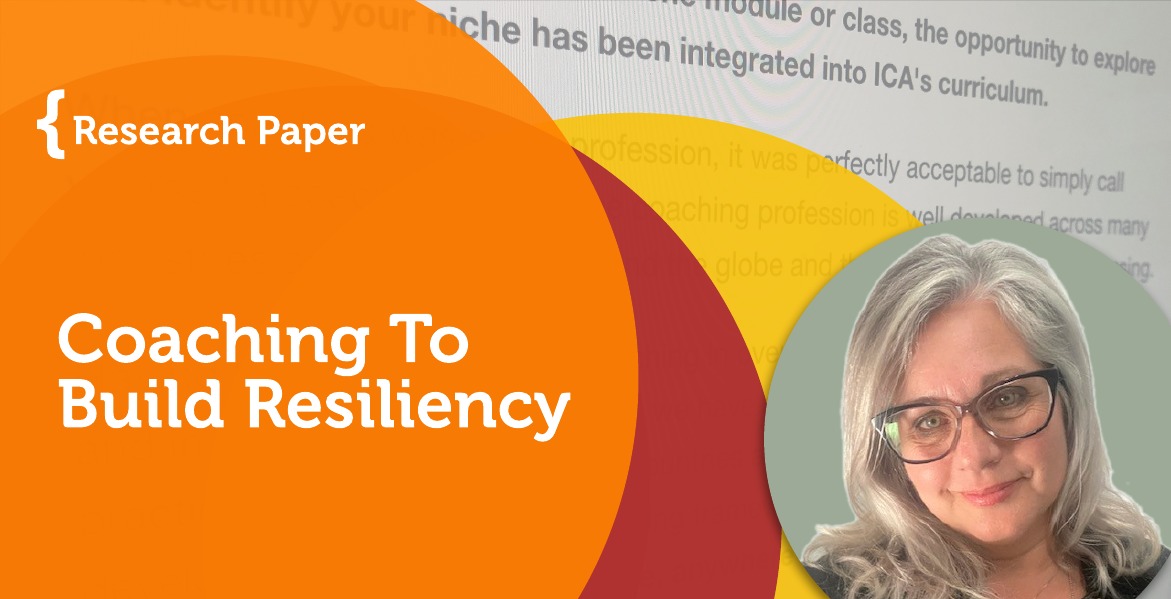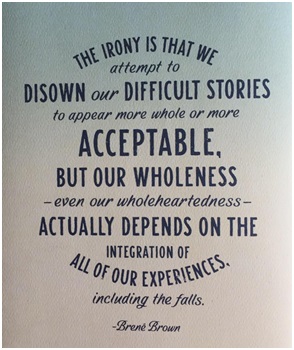 Research Paper By Cara Coulson
Research Paper By Cara Coulson
(Mindfulness/Life Coach, CANADA)
 Introduction
Introduction
One of the most surprising things I noticed when I began teaching at a local college was the number of my students who encountered overwhelming anxieties resulting from the fear of making mistakes, combined with a lack of resiliency to overcome perceived failure. Over the years, I have seen the quality of resiliency decline even further and anxiety rise for college students as they enter adulthood. Navigating the challenges of school and figuring out life as an adult can feel overwhelming. One could argue that the raising of these young adults in a protective fantasy bubble rich in rewards for all; a ‘no one left behind’ environment centered around a belief of the importance for none to feel failure, or in fact, any emotional discomfort could be a strong reason why. Instead, awarding all children a trophy or gold star regardless of effort was the suggested action course. They got constant recognition for the ordinary achievements they made; in fact, all achievements were applauded as extraordinary. This lack of resiliency creating a challenge at the crucial stage of entering adulthood is not their fault. Child-rearing psychology commanded that parents and educators build up children as they learn, dispensing positive reinforcement for every ordinary achievement. While this has reaped many remarkable developments, one thing was forgotten; when a child does not win the game, pass the test, or get chosen to win an award, they learn how to live with disappointment, and they can build the aptitude of resiliency. Failure enables an ability to develop the inner belief in being able to persevere, to create a set of skills and merits that allow one to learn to climb the ladder success, including the necessary slips along the way. The ability to build resiliency is much more critical for growth and the capacity to deal with hardships than the idea of protecting feelings that could be hurt by facing failure. The old lesson, ‘if at first, you don’t succeed, try, and try again,’ was taken away from this generation. Green young adults are entering into post-secondary situations with no skill set to cope with the fast pace, failures, and actual reality of the challenges it brings. This paper will examine resiliency and coaching applications to develop a mindset to maneuver the path to success, understanding that mistakes are the stepping stones that line the way.
What is resilience?
Often, I have found my students unable to move past a mistake. They focus solely on the shame they build within themselves and the story’s power in their mind that tells them they are not good enough to succeed. Anxiety takes over, and the student becomes incapacitated; in fact, the pressure finds power attached to the voice in the head, and it merely feeds upon the fear and grows. Learning to be okay with making mistakes is a critical skill-not just tied to resilience but also future success. A recent study found that young scientists who experienced a significant challenge or error early in their career went on to higher recognition than scientists who had not been challenged with mistakes early in their career. (Psychology Today, 2020). World-renowned storyteller Stephen King was rejected so often by publishers for his first manuscript, ‘Carrie,’ that he eventually threw it into his garbage, never to see the light of day and or feel bitter rejection again. It was his wife, Tabatha, who fished it out and sent it to one more publishing house without his knowledge; the rest, we all can attest, is history. When his resilience dimmed, she gave it one more attempt, possibly because the ‘failure story’ did not plague her. Resilience is the psychological quality that allows some people to be knocked down by life’s adversities and come back at least as strong as before. Rather than letting difficulties, traumatic events, or failure overcome them and drain their resolve, highly resilient people find a way to change course, emotionally heal, and continue moving toward their goals. (Psychology Today, 2020). Accepting that one can and will make mistakes helps build better emotional regulation, which can benefit one in various domains from relationships to school to the workplace. (Psychology Today, 2020). In developing and directing powerful coaching questions to assist a client in analyzing and accepting a setback, a client can learn how to move forward from the failure and not repeat it.
Resilience is the ability to recover from and accept difficult experiences, it also develops profound personal growth. While adverse events, much like rough river waters, are undoubtedly painful and challenging, they do not have to create a belief system of failure. (American Psychological Association, 2012). Many factors that determine resilience-such as genetics, early life experiences, and luck-can not be modified. However, specific resilience-building skills can be learned. These include breaking out of negative thought cycles, pushing back against catastrophizing, and looking at upsides when facing setbacks. (Psychology Today, 2020). When individuals perceive they are in control of what happens to them, they display an internal locus of control. With an external locus of control, an individual attributes all that occurs to them to surrounding factors. An internal locus of control is tied to greater resilience. (Psychology Today, 2020). Like building a muscle, increasing resiliency takes time and intentionality. A coaching focus on four core components-connection, wellness, healthy thinking, and meaning-can empower a client to bounce back from and learn from difficult and traumatic experiences. (American Psychological Association, 2012). As a coach developing the language of resilience building is critical. Creating a set of thought-provoking and insightful questions centered on exploring how the client developed strategies to cope with failure, defining what those strategies are, and acknowledging them with recognition represents awareness of what the client has already in their tool belt. Encouraging a client to recognize what methods have worked or, more importantly, what else could work can help the client recover from past perceived mistakes and create a strategy moving forward while fostering resiliency.
It is how you look at it.
All of us are capable of worry and rumination: we can take a minor thing, blow it up in our mind, run through it over and over, and drive ourselves crazy until we feel like that little thing is the worst thing that ever happened in a sense, it is a self-fulfilling prophecy. (Konnikova, 2016). Columbia University has been a leader in developing studies and learning about resilience. In research at Columbia, neuroscientist Kevin Ochsner has shown that teaching people to think of stimuli in different ways-to reframe them in favorable terms when the initial response is negative, or in a less emotional way when the initial reaction is emotionally “hot”-changes how they experience and react to the stimulus. People can be guided to better regulate their emotions, with lasting effects. (Konnikova, 2016). When one can frame adversity as a challenge, one becomes more flexible, can deal with it, and move on. The client can learn from it and grow. When one frames adversity as a threat, a potentially traumatic event can become an enduring problem; inflexibility occurs, and negative affect deepens. (Konnikova, 2016). The critical factor in building resilience is embracing healthy thought patterning and reframing a negative outlook. The ability to keep things in perspective, accept change, maintain a hopeful outlook, and learn from past mistakes increases the capacity for resiliency to weather and grow. (American Psychological Association, 2012).
Coaching Applications to Develop Resilience
Adversity and stress are a part of real life, but how we respond is our responsibility. We can succumb to the pressure and wallow in it (apathy), or we can rise to the occasion to explore ways to bounce back (growth). (Miller, 2020). To coach in building skills for resilience, acknowledgment, and recognition of the process of change must be abundant. By helping a client focus on what has worked well for them in the past, a baseline for their resilience can be established. (Miller, 2020). By asking open-ended questions, the coach can allow their client to personally explore areas they may not have viewed in the past as beneficial skills. (Miller, 2020). For example:
Coaches certified in resilience training can use specific tools in corporate, individual, or group settings to encourage the development of this much-needed skillset. An example of some of these are:
Conclusion
As coaches, it is essential to realize that any opportunity for a client to acknowledge or build upon resiliency is a rich one. Knowing the “how” of resilience is a much-needed and in-demand skill set. (Miller, 2020). Awareness that not all clients that work with us have developed a healthy ability to depend on resiliency. Traumatic events in one’s life can also challenge internal locus and belief in resiliency. However, as we work with clients, there are tools to utilize and questions to ask to foster a healthy development or recovery of resiliency. George Bonanno, a clinical psychologist at Columbia University, has been studying resilience for over 20 years. His findings suggest that the experience of failures or trauma is not inherent in the event itself; instead, it resides in the event’s psychological construal. Positive construal can be learned. (Konnikova, 2016). As a coach, this is fertile ground to create an awareness of resiliency for our clients to enable them to till and plant an abundant garden of belief in their ability to weather life’s challenges.
References
Ackerman, C. E. (2020, 12 10). How To Build Resilience With Resilience Training (+ Real-Life Examples). PsychologyToday.com. Retrieved 12 20, 2020
American Psychological Association. (2012). Building Your Resilience. Retrieved 12 20, 2020
Konnikova, M. (2016, February 11). How People Learn To Be Resilient. Retrieved 12 20, 2020
Miller, K. (2020, 01 09). Resilience Coaching and Counseling: 29 Helpful Tools and Techniques. Positive Psychology.com. Retrieved 12 20, 2020
Psychology Today. (2020). Resilience. Retrieved 12 20, 2020